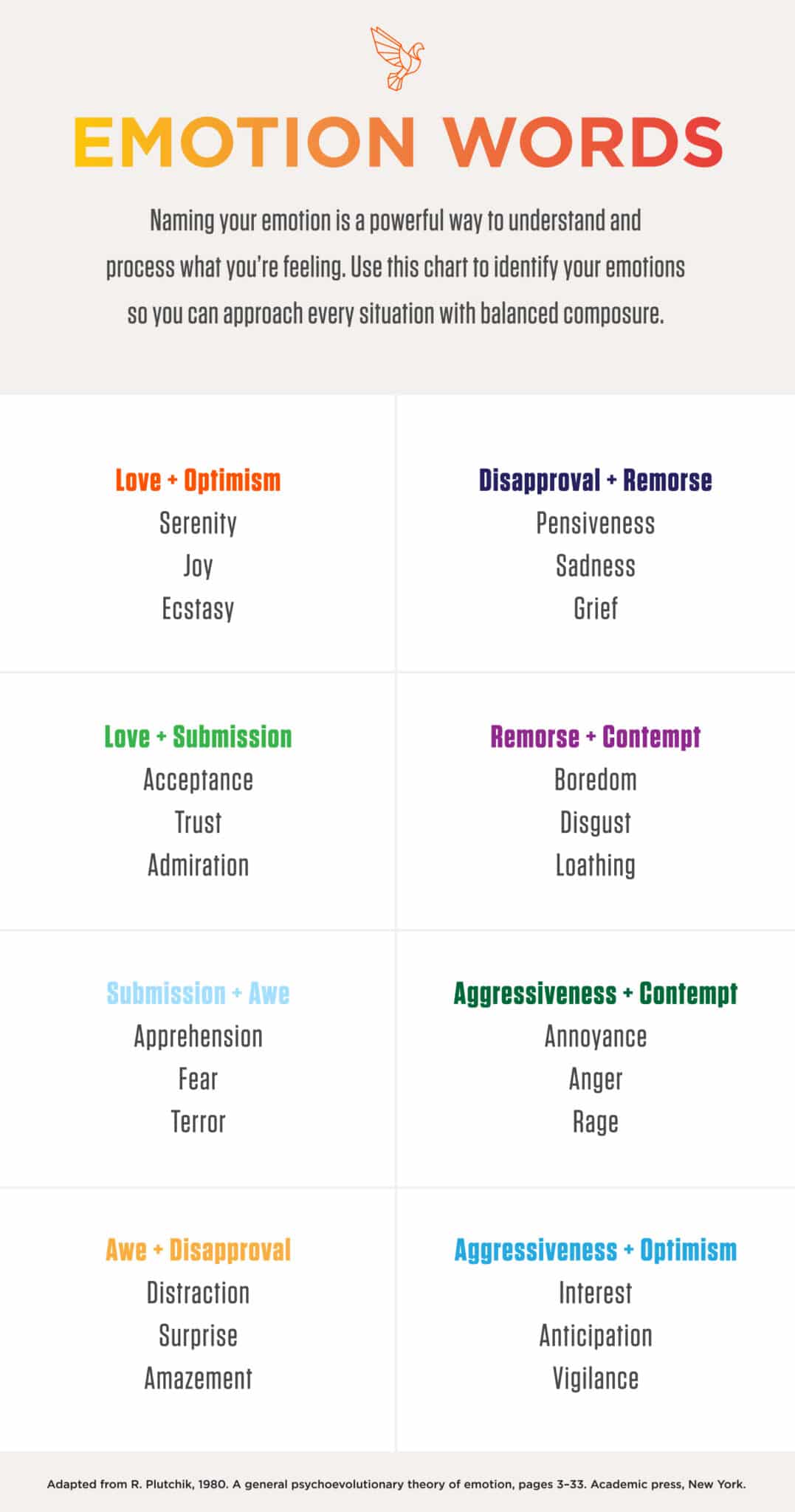
[tldr]
- Emotional intelligence is being aware of your own emotions and the emotions of others, and the ability to control your own emotions. It also measures how effective you are in close relationships.
- Studies show that high emotional intelligence is associated with better relationships, more successful academics, and better work performance.
- Emotional intelligence also predicts mental performance better than general intelligence measures do.
- Keep reading to learn more about emotional intelligence and how to improve yours to thrive in your work and life.
[/tldr]
Over the last decade or so, emotional intelligence has drawn a lot of attention as a way to improve your success in life. Studies have shown that high emotional intelligence is associated with satisfaction in relationships,[ref url=”https://www.sciencedirect.com/science/article/pii/S0191886907004308″] makes for a smoother transition from high school to college,[ref url=”https://www.sciencedirect.com/science/article/pii/S019188690300076X”] influences success in medical school,[ref url=”https://psycnet.apa.org/record/2013-39648-001″] and predicts performance on cognitive tasks better than general intelligence measures (knowledge tests and ability to calculate, etc.).[ref url=”https://www.tandfonline.com/doi/abs/10.1080/00224540209603891″]
Keep reading to learn more about emotional intelligence and how to improve yours to thrive in your work and life.
Instantly download this emotions list to help you identify your emotions and better control them. (Or, print in grayscale.)
What is emotional intelligence?

- Self-awareness: recognizing your own feelings. For example, “I’m feeling apprehensive or angry.”
- Managing emotions: handling your own feelings with composure and understanding what is causing you to feel the way you feel
- Self-motivation: using your emotions to further your own goals. Self-motivation also involves being able to control your emotions and the ability to step back and think before you act impulsively
- Empathy: sensitivity to the emotions of others and being able to put yourself in others’ shoes
- Relationships: social skills and social appropriateness
Related: How to Deal With Difficult People, According to Science
How do you test emotional intelligence?

Some of the more commonly used emotional intelligence assessments include the Mayer-Salovey-Caruso EI Test (MSCEIT) and the Emotional Quotient Inventory (EQ-i). Tests are available on the publishers’ websites for purchase, or you can ask your doctor or therapist to administer the test to you. Some employers use emotional intelligence tests as a screening tool.
Why everyone should continually work on mental strength

Psychotherapist, psychology professor, and licensed social worker Amy Morin is the bestselling author of “13 Things Mentally Strong People Don’t Do,” with two more “13 Things” books written specifically for women and parents. She wrote it originally as a note to herself, as she noticed over years of her psychotherapy practice that there were certain things mentally strong people consistently did not do.
On an episode of Bulletproof Radio, (iTunes) psychotherapist Amy Morin shares the inspiration behind her books, including the bestselling “13 Things Mentally Strong People Don’t Do.”
“I realized that people who were stronger than others, there were certain things that they just didn’t do, so that no matter what they went through, no matter what sort of practices they were doing, as long as they didn’t do certain things, they came out mentally stronger,” she says.
Related: Unexpected Ways to Build Resilience in 7 Days
How to improve your emotional intelligence
 Practice labeling your emotions
Practice labeling your emotions
Labeling your emotions brings to light how your feelings might be impacting your thoughts around a situation.
“Although feelings affect every decision you make, most people don’t spend much time thinking about how they’re feeling,” says Morin. “In fact, they’re often more comfortable saying things like, ‘I had butterflies in my stomach,’ or ‘There was a lump in my throat,’ rather than saying, ‘I felt anxious,’ or ‘I felt sad.’”
Bonus: when you’re in an emotional situation with another person, label their emotion, too. In most cases, you’ll want to keep that to yourself.
Limit your screen time
Studies have shown that screen time makes it more difficult to read emotions.
Morin advises, “Staring at your laptop or smartphone for countless hours can impair your ability to read other people’s feelings. Consider doing a digital detox every once in a while. Going a few days without your electronics could do wonders for your ability to read other people’s emotions.”
Here’s how to do our own digital detox experiment.
Spend a few minutes thinking about how another person is likely to feel
Morin also suggests reframing a situation to put yourself in the other person’s shoes.
“Rather than jump into an argument or interrupt someone you disagree with, put your focus on developing a better understanding of how the other person is feeling.
“Start paying close attention to other people’s emotional states. See if you can recognize how someone is feeling and how that emotion is likely to influence that individual’s perception and behavior,” she says.
Take full responsibility for how you feel
Another thing Morin strongly advocates for is not giving away your power. You are in control of how you feel and how you react to things.
“Rather than blame your boss for making you mad, consider what steps you can take to calm yourself down. Instead of saying your mother makes you feel bad about yourself, focus on repairing your own self-esteem,” says Morin.
Learn to accept your emotions
Whether at school, in the workplace, or even in your own family, too often people are either directly or indirectly taught to suppress their emotions or to be ashamed of them. There’s a societal attitude that appropriate emotional reactions indicate weakness.
Reject that idea. There’s a difference between having an appropriate emotional reaction and an inappropriate one, like lashing out at a co-worker. There’s a difference between a public display of emotion, and honoring and processing how you’re feeling, either privately or with trusted friends or loved ones. When you have an emotional response, like overwhelming resentment or embarrassment, acknowledge them and move through them appropriately for the situation.
Manage your fears
When you want a certain outcome, it’s easy to get into an all-or-none mindset: I’ll be so happy if I get into Firstchoice University, and my future is ruined if I don’t.
Especially when certain aspects are beyond your control, reduce your fears by imagining alternate outcomes: It will feel like a letdown at first, but I know that my second and third choice colleges will open up so many doors for me.
Put some space between the scenario and your reaction
When you’re in a difficult conversation, don’t feel the need to come to a resolution right away. Politely excuse yourself to collect your thoughts. Things to try:
- Take a walk
- Call someone for advice, as long as the matter is not private
- Splash some water on your face or get outside to cool off, literally and figuratively (cooling your body temperature reduces stress)[ref url=”https://www.ncbi.nlm.nih.gov/pubmed/1326118″]
- Write out the scenario to organize your feelings
- Rehearse a calm response
- Do a breathing exercise
When you’re panicked, fight-or-flight activates and rational thought takes a back seat. The goal is to create enough distance that you can get out of fight-or-flight mode and regain rational thought.
Start a meditation practice
There’s lots of evidence that meditation increases emotional intelligence.[ref url=”https://www.tandfonline.com/doi/abs/10.1080/19349637.2014.925364″][ref url=”https://onlinelibrary.wiley.com/doi/abs/10.1002/smi.1289″]
Meditation reduces overall stress and helps you learn to recognize thoughts as outside yourself. It takes some practice. Here’s how to get started with meditation.
Practice gratitude
Gratitude can reframe your thoughts and help you see the positive in every scenario. If you practice gratitude when you’re feeling neutral, you’ll be better at it when emotions run high. Here’s how to practice gratitude.
You don’t need to overhaul your life and take on every single new practice. You’ll notice a difference just by increasing your awareness and intentionally incorporating one or two new practices. Use every difficult situation as an opportunity to get better at managing your emotions.
 Practice labeling your emotions
Practice labeling your emotions










